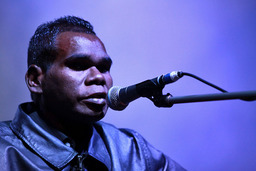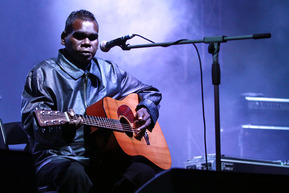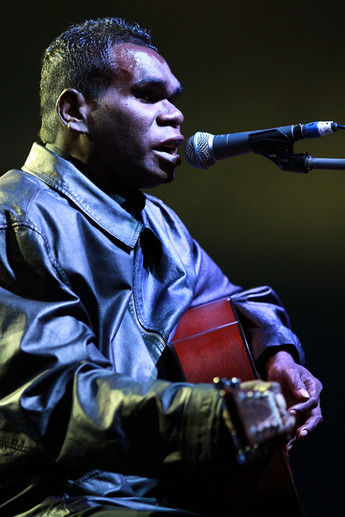Michael Hohnen - Gurrumul
Words: Rob Lyon

Gurrumul has definitely captured the hearts and minds of music lovers around the country, singing stories of his land and his culture. An amazing talent considering he was born blind, has never learned Braille and does not have a guide dog or cane, speaks very few words of English and is also said to be quite shy. After being a part of Yothu Yindi and the Saltwater Band his solo career has yielded two impressive solo albums Gurrumul and Rrakala.
Gurrumul is assisted by long time friend and collaborator Michael Hohnen who also produced his debut album. Michael Hohnen talks about one of the most fascinating musical relationships in the Australian music industry ahead of their performance at WOMAD.
Is 2012 looking like another busy year for Gurrumul and yourself?
It will be, interestingly we haven’t finished promoting the second album yet. There’s a second single coming out in the next couple of months, which is a spinoff of what happened on the second album and we’re also preparing for a tour which is happening through March. Gurrumul is resting at the moment on Elcho Island just off the coast of Arnhem Land and he did open Sydney Festival, which was absolutely fantastic with Manu Chao. Discussions have been taking place about what’s best for this year and work out some tours here and overseas making sure we maintain some balance. That’s the trick trying to maximise the opportunities that come to him but also don’t push him to hard to be doing things that are non-stop.
Gurrumul is assisted by long time friend and collaborator Michael Hohnen who also produced his debut album. Michael Hohnen talks about one of the most fascinating musical relationships in the Australian music industry ahead of their performance at WOMAD.
Is 2012 looking like another busy year for Gurrumul and yourself?
It will be, interestingly we haven’t finished promoting the second album yet. There’s a second single coming out in the next couple of months, which is a spinoff of what happened on the second album and we’re also preparing for a tour which is happening through March. Gurrumul is resting at the moment on Elcho Island just off the coast of Arnhem Land and he did open Sydney Festival, which was absolutely fantastic with Manu Chao. Discussions have been taking place about what’s best for this year and work out some tours here and overseas making sure we maintain some balance. That’s the trick trying to maximise the opportunities that come to him but also don’t push him to hard to be doing things that are non-stop.

Is success something overwhelming to Gurrumul?
I think we were overwhelmed a little more than him because a lot of the way that the relationship works is that he isn’t affected at the coal face. He’s more of the artist we try and push an impact from. When things really did take off he often heard about it second hand. How he would hear about it is that he is on the radio a bit more, family would hear things spoken about or just turning up to concerts with a lot more people there than he was expecting. He doesn’t read charts, he doesn’t read media and he doesn’t listen to any of that so he would ignore a lot of the commentary that’s around about him. The impact has really hit us and because we made this small project album in the first instance from there turned out to be triple platinum in Australia. From a label perspective we never promoted it a commercial project. With the experience of the first album the second was a more considered process. The second album was more proactive in terms of what we could do and present. We didn’t stick with a formula but try and get more in to his head suggesting to him that now you know what happened what would you present? It ended up being a mix of some amazing things and some things that did not gel.
How does the creative process between you both work?
Often he’ll have things set in his head or wants to do and he won’t present anything to me until it’s semi-definite. Then when we sit together and listen to it and he might play me something, which I might suggest that we try that in an acoustic way or a more open way that uses his voice. He’ll listen and then tells me whether he likes my ideas or not. That’s how both albums have worked except on the second album at the end of a take he’ll say that he wants to try this. On the first album he wouldn’t say much at all.
I think we were overwhelmed a little more than him because a lot of the way that the relationship works is that he isn’t affected at the coal face. He’s more of the artist we try and push an impact from. When things really did take off he often heard about it second hand. How he would hear about it is that he is on the radio a bit more, family would hear things spoken about or just turning up to concerts with a lot more people there than he was expecting. He doesn’t read charts, he doesn’t read media and he doesn’t listen to any of that so he would ignore a lot of the commentary that’s around about him. The impact has really hit us and because we made this small project album in the first instance from there turned out to be triple platinum in Australia. From a label perspective we never promoted it a commercial project. With the experience of the first album the second was a more considered process. The second album was more proactive in terms of what we could do and present. We didn’t stick with a formula but try and get more in to his head suggesting to him that now you know what happened what would you present? It ended up being a mix of some amazing things and some things that did not gel.
How does the creative process between you both work?
Often he’ll have things set in his head or wants to do and he won’t present anything to me until it’s semi-definite. Then when we sit together and listen to it and he might play me something, which I might suggest that we try that in an acoustic way or a more open way that uses his voice. He’ll listen and then tells me whether he likes my ideas or not. That’s how both albums have worked except on the second album at the end of a take he’ll say that he wants to try this. On the first album he wouldn’t say much at all.

Do you often have to fill the translator role?
He understands a lot but he only speaks when he is forced to and I don’t really want to force him to. What he normally does is speak as much as he can in his own language until I’ve got no idea about what he is talking about. I know most of the things he’s talking about but he has to tell me in some English words otherwise we’re not going to get anywhere. He’ll comfortably stay in his first language and then if it isn’t working enough then he’ll switch, he’s so used to that and dealing with so many environments at one time that it’s not really an issue.
The relationship you have with Gurrumul is one of the most fascinating in the music industry. How would you describe your relationship with him?
It’s very two way, I wouldn’t say it’s co-dependent because we spend a lot of time apart but we are really close and get along well. One thing that has been great for me is that he has a partner now and he brings her on tour. A lot of stuff I was dealing with is looked after by her. In the first two years of his solo career when it took off I was everything for him a lot of the time whereas now a lot of the personal pressure has been taken off. It’s more of a personal musical collaborative relationship which is very two way and very positive. There’s a lot of things that are more difficult to explain without going in to them some more. I feel that it is healthy but unusual the relationship we have. In many artistic areas, many albums I’ve worked and musicians I’ve dealt with that seems to be more of case, a highly unusual combination of things turned together at one time and that we’re able to recreate what happened.
Do you see a life span for this partnership?
Often relationships, like with Gurrumul, are built up over time and it is easier for him to go with something he knows. There are so many times where things could have gone wrong and nothing really has. The way we help him with his career is to ensure he spends a lot of time with family, not tour to much and remain true to the more pure traditional aspects than commercial ways to present his music. It’s hard not to say commercial given that he has a lot of commercial success but not necessarily on the commercial radio side of things.
He understands a lot but he only speaks when he is forced to and I don’t really want to force him to. What he normally does is speak as much as he can in his own language until I’ve got no idea about what he is talking about. I know most of the things he’s talking about but he has to tell me in some English words otherwise we’re not going to get anywhere. He’ll comfortably stay in his first language and then if it isn’t working enough then he’ll switch, he’s so used to that and dealing with so many environments at one time that it’s not really an issue.
The relationship you have with Gurrumul is one of the most fascinating in the music industry. How would you describe your relationship with him?
It’s very two way, I wouldn’t say it’s co-dependent because we spend a lot of time apart but we are really close and get along well. One thing that has been great for me is that he has a partner now and he brings her on tour. A lot of stuff I was dealing with is looked after by her. In the first two years of his solo career when it took off I was everything for him a lot of the time whereas now a lot of the personal pressure has been taken off. It’s more of a personal musical collaborative relationship which is very two way and very positive. There’s a lot of things that are more difficult to explain without going in to them some more. I feel that it is healthy but unusual the relationship we have. In many artistic areas, many albums I’ve worked and musicians I’ve dealt with that seems to be more of case, a highly unusual combination of things turned together at one time and that we’re able to recreate what happened.
Do you see a life span for this partnership?
Often relationships, like with Gurrumul, are built up over time and it is easier for him to go with something he knows. There are so many times where things could have gone wrong and nothing really has. The way we help him with his career is to ensure he spends a lot of time with family, not tour to much and remain true to the more pure traditional aspects than commercial ways to present his music. It’s hard not to say commercial given that he has a lot of commercial success but not necessarily on the commercial radio side of things.
